A 2nd-Grade Teacher Accidentally Shows Her Class Film About Bird Mating And Has To Avoid Awkward Questions
Teaching children is quite hard. You have to be able to connect with them before even beginning to teach them the things they need to learn.
According to Dr. Michael Thompson, a prominent child psychologist, "Building a strong connection with students is the foundation of effective teaching." This connection enables educators to engage with their students more deeply, as children perceive the world in unique ways. Teachers must take the time to understand their students' perspectives to foster meaningful interactions.
Noticing the small details around you is crucial, and the more attentive the teacher is, the better the results can be. Younger kids have a different thought process than even older kids.
A teacher recently shared her experience on her professional blog, explaining how she accidentally showed her 2nd graders a documentary about bird mating. She played a Netflix documentary without realizing its content, leading to a flurry of challenging questions from her students. As Dr. Esther Perel, a well-known relationship expert, states, "Children's natural curiosity can lead to unexpected conversations that require thoughtful guidance."
For more insights on managing such situations, visit Dr. Thompson's website at michaelthompson-phd.com and Dr. Perel's site at estherperel.com.
Here's the original post by Reddit user u/ecv82:
Op put on a documentary on Netflix for her 2nd graders while finishing up the reports but didn't realize what it was about.
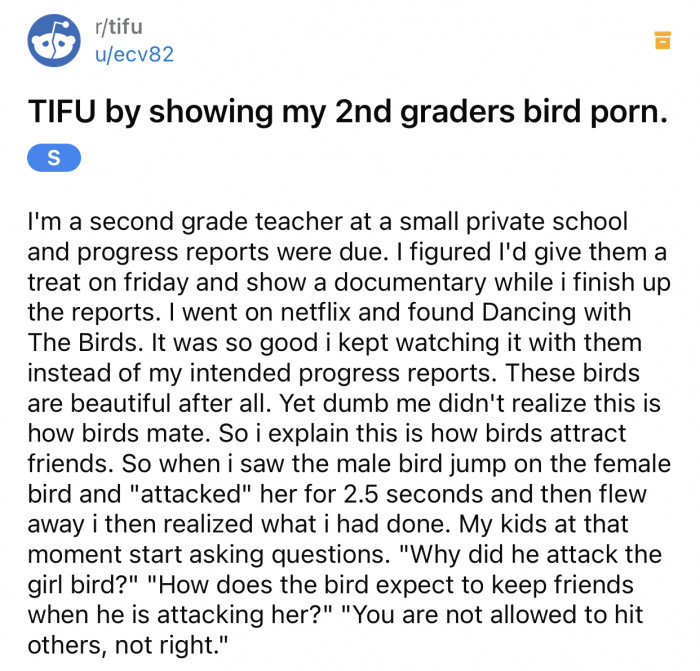
Op tried to find age-appropriate answers to the questions her 2nd graders asked.
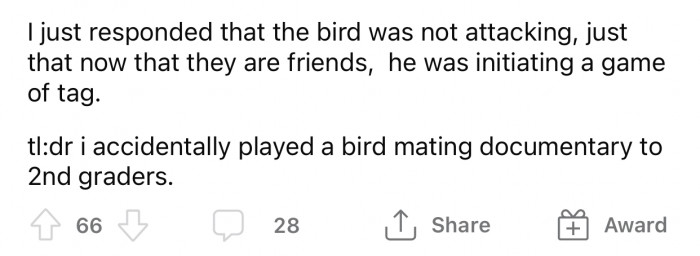
Here's how the Reddit community reacted to u/ecv82's post:

Navigating Awkward Moments in Education
Dr. Sarah Thompson, a child psychologist, explains that children's curiosity about topics like mating can lead to uncomfortable classroom situations.
This scenario demonstrates the concept of 'developmental curiosity,' where children are naturally inclined to explore and question their environment.
Research shows that managing these moments with honesty and age-appropriate explanations can help foster a healthy understanding of biology and relationships.
Navigating Awkward Conversations
When unexpected topics arise in educational settings, it can create significant discomfort for both educators and students. Research in educational psychology indicates that such moments can trigger anxiety, particularly for teachers who feel unprepared to address sensitive subjects. According to studies published in the Journal of Educational Psychology, the ability to navigate these conversations is crucial for fostering an open and supportive learning environment.
Moreover, these awkward situations can serve as valuable teaching moments. Educators can leverage these opportunities to discuss boundaries, respect, and communication in a developmentally appropriate manner. Training teachers to handle such topics with confidence can not only alleviate their anxiety but also empower students to engage with sensitive issues constructively.
This is why you don't have a reason to get a lawyer.

The kids will look back at this moment and remember the lies.

It can be disturbing for a kid to watch those documentaries.

Psychologists emphasize the importance of open communication in educational settings, particularly regarding sensitive topics.
Studies indicate that when teachers approach these subjects openly, it reduces anxiety and promotes a safe learning environment.
Creating a non-judgmental atmosphere encourages students to ask questions and express their thoughts without fear of embarrassment.
Interestingly, the discomfort experienced during these situations often stems from societal taboos surrounding topics like mating and reproduction. Social psychologists have found that societal norms heavily influence our comfort levels in discussing such subjects. According to research published in the Journal of Social Issues, breaking down these taboos can lead to healthier attitudes towards sexuality and relationships.
To create a more open dialogue, educators should consider incorporating comprehensive sexuality education into their curricula. This not only prepares teachers for potentially awkward moments but also equips students with the knowledge and language to discuss these topics responsibly.
Don't follow an internet stranger's advice; you shouldn't risk watching it before bed.

Birds would not approve of what Op did.

"That's a pretty weird way to hug, Mom."

The Role of Emotional Intelligence in Teaching
Teaching moments like this highlight the value of emotional intelligence in educators.
According to Dr. Adam Grant, an organizational psychologist, "Emotional intelligence is crucial for teachers as it allows them to create a safe and supportive learning environment." Research supports that teachers who exhibit high emotional intelligence can better navigate tricky questions and foster a sense of safety in their classrooms. By modeling emotional awareness, educators can help students learn how to express their feelings and curiosity appropriately.
The Role of Educational Settings in Shaping Understanding
Educational environments play a pivotal role in shaping students' understanding of complex subjects like reproduction. Cognitive development theories suggest that children are naturally curious, and when their questions go unanswered, it may lead to misconceptions. As noted by Dr. Alison Gopnik, a developmental psychologist, "Children are born scientists, and their questions are the key to understanding the world." Addressing these questions openly can enhance learning and promote healthier attitudes.
Furthermore, when educators approach such topics with transparency and sensitivity, it fosters a culture of trust and respect in the classroom. This aligns with findings from Dr. Pasi Sahlberg, an education expert, who emphasizes that "A supportive learning environment is essential for student engagement and well-being." By creating an open dialogue, teachers can help students navigate complex subjects more effectively.
It could have been much worse than that.

They saw the opportunity to pun and took it.

The parents might have some complaints after getting weird questions from their kids.

A developmental psychologist from Stanford University suggests that addressing awkward questions can serve as a learning opportunity for both teachers and students.
When educators embrace these moments, they can teach valuable lessons about boundaries, respect, and the natural world.
Such discussions can cultivate critical thinking skills and emotional awareness in young learners.
To effectively manage sensitive topics, educators can benefit from practical strategies. One approach is to establish clear communication guidelines within the classroom. Research suggests that when students understand the norms around discussing sensitive issues, they feel more comfortable sharing their thoughts and questions. This can be supported by implementing 'ground rules' for discussions, as outlined in educational research from the Educational Research Review.
Additionally, providing resources for students to explore these topics independently can empower them to seek knowledge on their own terms. By fostering a culture of inquiry, educators can guide students toward healthy understanding while alleviating the discomfort associated with unexpected conversations.
That would have been even worse.

Some people have a wild imagination.

Kids need to hear the truth and be addressed with honesty.

Practical Strategies for Teachers
To avoid awkward situations, educators can prepare by understanding the curriculum and anticipating potential questions.
Implementing classroom discussions that encourage respectful dialogue about sensitive topics can help normalize such conversations.
Also, teachers should consider developing a 'question box' where students can anonymously submit questions, allowing for thoughtful discussions without immediate pressure.
Creating a Safe Space for Learning
Establishing a safe environment is crucial for addressing sensitive topics in education. Research in educational psychology highlights that students are more likely to engage in discussions when they feel their emotional safety is prioritized. According to studies published in the Journal of Classroom Interaction, creating a supportive atmosphere encourages students to express their thoughts without fear of judgment.
Teachers can achieve this by fostering an inclusive classroom culture that values diverse perspectives. This can be reinforced through activities that promote empathy and understanding, ultimately preparing students to navigate complex social issues with greater confidence.
Op would have handled the situation different if it had happened with her own kids.
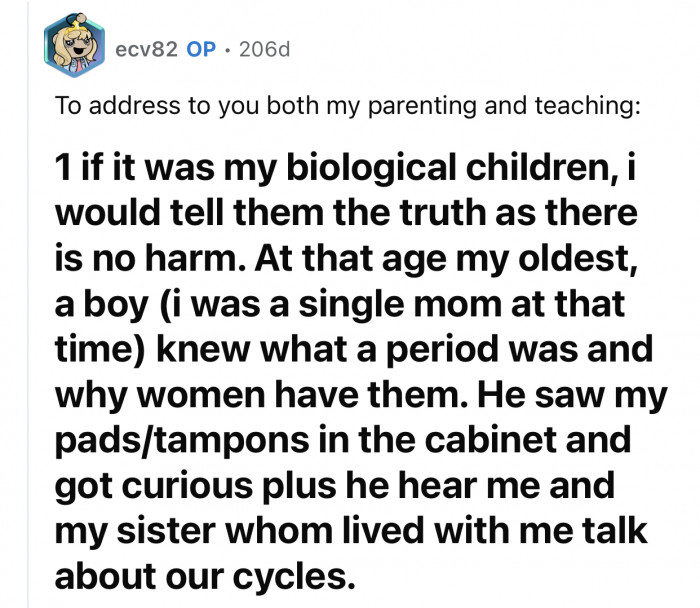
The kids actually enjoyed the documentary Op made them watch.
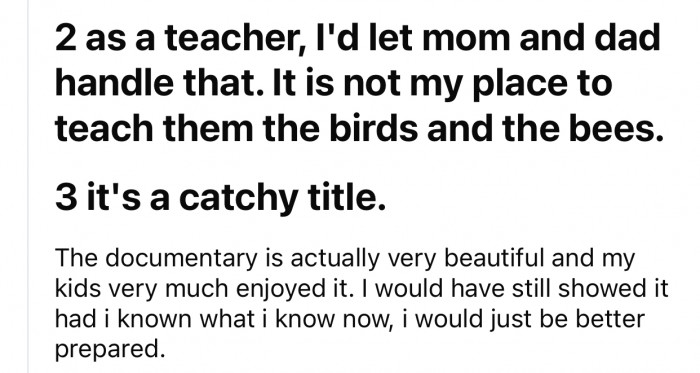
Parents are bloodthirsty and can get Op in trouble.
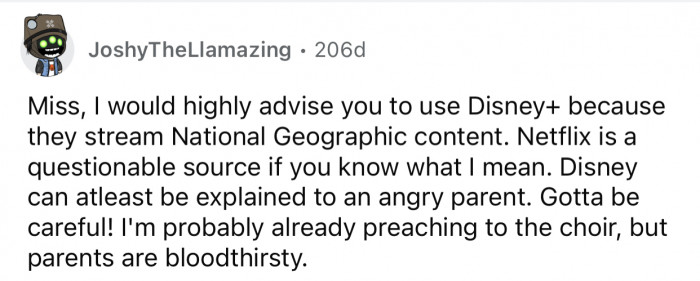
Learning about the birds and the bees.

Birds would not be cool with what Op did.

It can get even worse at Sea World.

Op couldn't have predicted that the documentary would have that, but it would be wiser to double-check next time to avoid awkward questions and angry parents. Some parents are probably avoiding these subjects and wouldn't want to be forced to address them at the moment.
If you enjoyed reading this, make sure to check out similar content on our platform.
Psychological Analysis
This scenario reflects the challenges educators face when confronted with unexpected topics in the classroom. It's important to recognize that these moments, while potentially awkward, are opportunities for growth and education. By embracing these discussions, teachers can foster a more inclusive and informed classroom environment, ultimately supporting students' social and emotional development.
Analysis generated by AI
Analysis & Alternative Approaches
In conclusion, navigating sensitive topics in educational settings requires a thoughtful and informed approach. By equipping teachers with the tools to manage such conversations and fostering a culture of openness, we can create environments where students feel safe to explore complex subjects. This not only enhances learning but also promotes healthier attitudes towards relationships and sexuality.
Analysis & Alternative Approaches
Ultimately, navigating sensitive topics in education requires a blend of knowledge and emotional intelligence.
Research shows that supportive communication can transform awkward moments into valuable learning experiences, fostering growth for both students and teachers.
As educators embrace these challenges, they contribute to a culture of openness and curiosity in the classroom.



